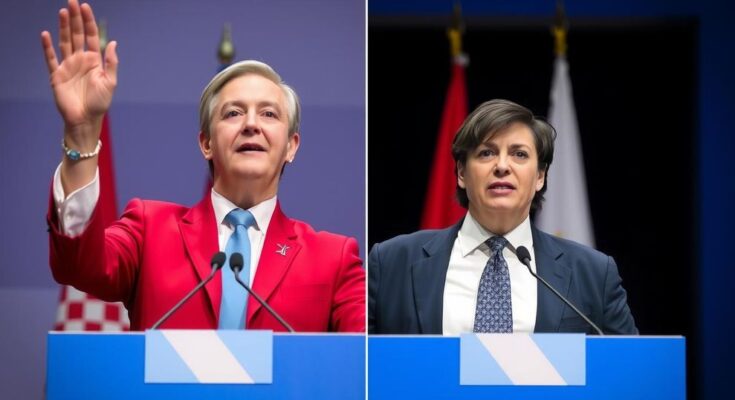Croatia’s President Zoran Milanovic faces conservative Dragan Primorac in a runoff after achieving 49.1% in the first round. Milanovic’s failure to secure an outright victory raises concerns for the ruling HDZ party. The election highlights ongoing issues of inflation, corruption, and their impacts on Croatia’s political future as both candidates intensify their campaigns ahead of January 12.
Croatia’s incumbent President Zoran Milanovic will compete against conservative challenger Dragan Primorac in a runoff election scheduled for January 12, following a narrow miss of outright victory in the first round. Official results indicate that Milanovic, supported by the Social Democrats, secured 49.1% of the vote, while Primorac, backed by the ruling HDZ party, garnered 19.35%. Milanovic’s failure to achieve a decisive majority raises significant concerns for the HDZ government led by Prime Minister Andrej Plenkovic, amid Croatia’s ongoing struggles with inflation, corruption, and labor shortages.
During his victory speech, Milanovic emphasized his commitment to advocate for Croatia’s interests, stating he would “fight for Croatia with a clear stance.” Primorac seized the opportunity to frame the upcoming one-on-one contest with Milanovic as a challenge, emphasizing the need for clarity in their respective platforms as the election moves forward.
The presidential role, although limited in power, carries substantial influence over the country’s foreign policy and defense. Milanovic, a divisive political figure known for his sharp rhetoric, has previously accused the HDZ government of systemic corruption and has positioned himself as a bulwark against perceived governmental overreach. His controversial comments regarding military aid to Ukraine have garnered attention, with Plenkovic accusing him of damaging Croatia’s standing in NATO and the European Union.
Primorac, a physician by profession with a return to politics after a significant interval, has promoted unity and traditional values as key components of his campaign. He has consistently criticized Milanovic, accusing him of “disgracing Croatia,” while also calling for a peaceful and unified nation. Voter turnout for the initial round stood at 36%, reflecting a slight decline compared to prior elections.
As the election proceeds, it underscores a continuation of the long-standing power struggle between these leading politicians, ultimately determining not just Croatia’s leadership but also its political trajectory in an era of ongoing challenges.
Croatia, a member of both the European Union and NATO, is currently grappling with multiple pressing issues such as soaring inflation, rampant corruption, and a significant shortage of labor. The presidential office, though limited in executive authority, plays a crucial role in shaping the political landscape, especially given the HDZ party’s predominant control since the country’s independence. The upcoming runoff between Milanovic and Primorac signifies a pivotal moment in Croatia’s electoral history, intensifying the political rivalry and public focus on leadership qualities and national priorities.
The impending runoff election between President Zoran Milanovic and challenger Dragan Primorac will be decisive for Croatia’s political future. Milanovic’s tenure has been marked by confrontational rhetoric and accusations against the ruling party, while Primorac’s campaign strategy promotes unity and traditional values. The political climate is charged, with underlying issues of corruption, foreign policy stances, and the dire economic situation shaping voters’ decisions. The outcome will influence not only the presidency but potentially the course of governance in Croatia for years to come.
Original Source: www.lemonde.fr




